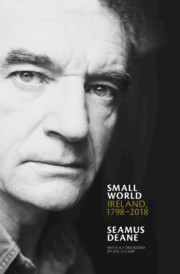Book contents
- Small World
- Small World
- Copyright page
- Dedication
- Contents
- Foreword
- Permissions
- Acknowledgements
- Chapter 1 Swift as Classic
- Chapter 2 Burke in the USA
- Chapter 3 Tone: The Great Nation and the Evil Empire
- Chapter 4 Imperialism and Nationalism
- Chapter 5 Irish National Character 1790–1900
- Chapter 6 Civilians and Barbarians
- Chapter 7 Heroic Styles: The Tradition of an Idea
- Chapter 8 Ulysses: The Exhaustion of Literature and the Literature of Exhaustion
- Chapter 9 Dead Ends: Joyce’s Finest Moments
- Chapter 10 Elizabeth Bowen: Sentenced to Death
- Chapter 11 Elizabeth Bowen: Two Stories in One
- Chapter 12 Mary Lavin: Celibates
- Chapter 13 Emergency Aesthetics
- Chapter 14 Wherever Green is Read
- Chapter 15 The Famous Seamus
- Chapter 16 The End of the World
- Index
Chapter 6 - Civilians and Barbarians
Published online by Cambridge University Press: 03 June 2021
- Small World
- Small World
- Copyright page
- Dedication
- Contents
- Foreword
- Permissions
- Acknowledgements
- Chapter 1 Swift as Classic
- Chapter 2 Burke in the USA
- Chapter 3 Tone: The Great Nation and the Evil Empire
- Chapter 4 Imperialism and Nationalism
- Chapter 5 Irish National Character 1790–1900
- Chapter 6 Civilians and Barbarians
- Chapter 7 Heroic Styles: The Tradition of an Idea
- Chapter 8 Ulysses: The Exhaustion of Literature and the Literature of Exhaustion
- Chapter 9 Dead Ends: Joyce’s Finest Moments
- Chapter 10 Elizabeth Bowen: Sentenced to Death
- Chapter 11 Elizabeth Bowen: Two Stories in One
- Chapter 12 Mary Lavin: Celibates
- Chapter 13 Emergency Aesthetics
- Chapter 14 Wherever Green is Read
- Chapter 15 The Famous Seamus
- Chapter 16 The End of the World
- Index
Summary
Those who live under the law are civilians; those who live beyond it are barbarians. ‘Law makes men free in the political arena, just as reason makes men free in the universe as a whole.’ Barbarians, therefore, are slaves, since they live in a world from which the operation of arbitrary individual will has not been eliminated. Law compels men to be free. In this paradox is to be found the nucleus of modern European theories of freedom, from Locke to Rousseau and beyond. But it was a common conception long before it received its articulation as an integral element in a comprehensive political philosophy.
- Type
- Chapter
- Information
- Small WorldIreland, 1798–2018, pp. 122 - 132Publisher: Cambridge University PressPrint publication year: 2021

